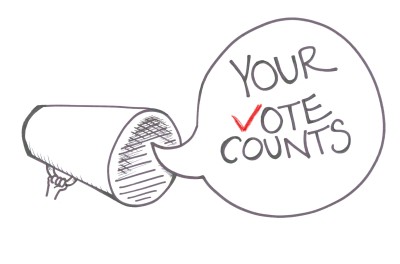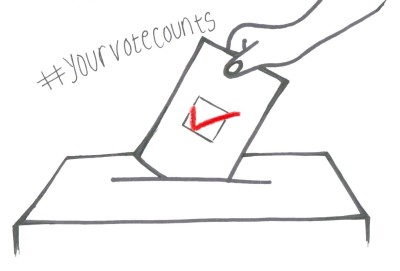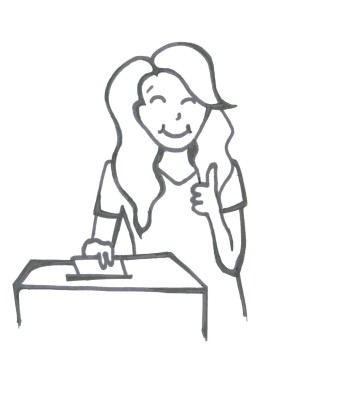STORY BY ERIN QUEENAN
When it comes to politics, Sheridan students are a lot like most other young Canadians. They know they should vote, but few actually bother to cast a ballot.
Illustration by Kristina Alkok, Sheridan Art Fundamentals graduate.
With Canadians facing one of its closest federal election races in years, Anastasia Bladaoshyna agrees she should vote on Oct. 19. “I think it’s important to know who will be in charge for certain things. This person will make some changes which will affect student’s lives.” At 18 years old, this will be Bladaoshyna’s first chance to vote.
“You have to have your voice heard,” says 26-year-old Simi Hundal, a Sheridan Bachelor of Finance graduate. “As young people we have influence,” says 18-year-old Kurtis MacNeil, a first year student in Media Fundamentals.
All three students had reasons why they should vote, however, when asked if they will vote, Bladaoshyna, Hundal and MacNeil all replied no. “I don’t vote because there is actually nobody that I am interested in,” shrugs Hundal. At 26 she has never participated in an election, and says neither have her three siblings. Bladaoshyna, just doesn’t know who to vote for and MacNeil has an issue with each party.
This opinion spans across the country. “Youth interest in politics is low. Young people typically do not pay much attention to politics and they vote in lower numbers,” says Nathan Mallett, who teaches Canadian History and Politics at Sheridan College.
Canadian young adults aged 18 to 34 have always been more likely not to vote than people 35 and up, according to the Elections Canada website. However, what has become a growing concern, according to an article in the Globe and Mail, is the gap between participation rate of voters aged 18 to 34 and the overall participation rate. Before 1980 you could expect young adults to be about 10 percent lower than the overall turn out. In the ‘70s total participation was around 80 per cent and young adults was 70 per cent. However, in the election in 2011, the turn out was 61.1 per cent by only 38.8 per cent of voters 18 to 24. That’s a difference of 22 percentage points.
Moran Marcella teaches 20th Century Canadian History and he believes the problem may be youth disengagement in general. Nowadays young people are more focused on what is going on in their own lives rather than national politics.
Mallett speculates the blame lies within the party platforms. “I remember in the 2011 election the liberals under Michael Ignatieff came up with a plan for tuition. They were going to give some tuition relief for students. You just don’t hear anything like that right now it’s just all the economy, economy, economy, leadership, leadership, leadership, and jobs, jobs, jobs. There is nothing specifically for young adults.”
Christian Knudsen, a Sheridan College professor of Canadian History, sees Marcella’s “youth apathy” and Mallet’s “party negligence” of youth issues as two contributing parts of a cycle. “I think, though, to some degree it is a self-fulfilling prophecy. If young people feel like they don’t have to vote, then political parties will feel like they don’t need to listen to young adults, and the cycle will continue.”
While there isn’t a clear answer as to who started this cycle, both students and political parties need to change. “I think blame could go around on all sides, but definitely the system could use an update. In other countries turn out has been higher. There needs to be a cultural shift,” says Marcella.
According to a British election study nearly 60 per cent of young people (aged 18-24) turned out to vote in the 2015 election, with only 38.8 per cent turnout, young Canadians lag behind.
But that small minority is speaking out. As a history teacher, Knudsen has already started discussing the election in his classroom and has been impressed by the knowledge of the youth participating in discussion. “There are some students that are really engaged. Sadly it is not a majority, they are a small minority that are actively engaged in elections, and I really hope that changes.”
MORE RELATED TO THIS STORY
- How to vote on Oct 19
- Live coverage of Sheridan’s All Candidates Debate 2015
- Sheridan elections debate
Jonathan Ricci, a fourth-year Political Science student at Wilfrid Laurier University, is a part of that minority. For the last five years he has been following the Conservative party, is former vice president of Laurier’s Campus Conservatives Club and in the summer he may have knocked on your door as he went house to house in Oakville speaking with families about the elections as a volunteer for the Conservative party.
In his opinion, it is no surprise the nationwide election conversation is quiet. “My dad always told me there are two things you don’t talk about at the table, religion and politics.” It can be awkward he says but it’s a talk worth having among peers. It might not be apparent to Canadian voters and youth voters, but every vote counts. “Elections can flip on a dime, particularly one like this where it is so close.”
And close it is.
“I think that one message that will perhaps really resonate with young people more than ever before is that in this election particularly their voice really will count. When it is so close to call, if young people on mass decided to vote, it will really change the election in the face of Canadian politics,” says Knudsen seriously.
Post-secondary institutions such as Laurier and University of Toronto know it’s important that their students vote, and are making efforts through clubs and student councils to get the student body talking politics. Laurier has set up a website page and a hash tag “lauriervotes” to inform students on parties and candidates, how to vote while living at school and other resources. Uof T has political clubs that are featured in the school newspaper The Varsity, is hosting a rally for votes, and the Student Union is directing students to election debates via its Facebook Page. At Sheridan there is one NDP club, and officials didn’t respond to a request to comment. The Sheridan Student Union has no plans for any kind of election awareness program.
It may be still early days but Mallett believes Sheridan Student Union lack of motivation has to do with Sheridan’s student demographic. “Students are here for education, it’s a commuter school, people come for their classes and they go home, there’s not a lot of campus life, and when you don’t have that campus life you miss out on things like that, a vibrant club scene, politically charged environment.” Sheridan clubs have not officially started yet, while at other universities joining clubs is an integral part of frosh week.
With a campus in Oakville, Mississauga and Brampton, Sheridan is a commuter college with students from all kinds of backgrounds. “They are here to get their skills, get out into the workplace and get a job” says Mallett. Students are focused on their career objectives which makes clubs and extra curricular activities fall into the background.
However he does remember a time when the Student Union was engaged in federal politics. When Mallett was a student at Sheridan 20 years ago in 1995, Quebec was mounting a campaign to separate from the country. In response the Sheridan Student Union unveiled a gigantic banner in one of the wings and asked all of the students to sign it because the banner was going to be put on a bus and taken to the rally in Montreal. “Now the banner did get scuttled out because of lack of interest,” chuckles Mallet, “but the difference is that back then they were actually trying.”
Voting is important in terms of making changes in policies and engaging in civil society. That’s a lot of what Marcella teaches in his courses. “Participating rather than just being isolated, not thinking in terms of one’s own life, but thinking in wider terms and being more aware.” Marcella believes educated youth are aware and that they just need to be reminded that if they did vote it would change a lot.
The outcome of Canada’s election at this point is far too close to call, and experts like Knudsen are saying they haven’t seen a race this tight in years. It is so close he predicts the outcome to be a minority government, however, even that is not a guarantee. “Ten per cent more voters would change outcomes quite a bit, actually” says Marcella.
Knudsen offers two arguments for getting involved in this year’s election. “One, it is so close that, really, every vote, really does count in a way that probably in the past hasn’t happened before.” In other words, youth have a chance to impact Canadian political history.
Second, Knudsen calls politics “a participation sport, the more one gets involved, the more one will help sway the future of political parties.” He says if students are dissatisfied this is their chance to say it: attend candidates debates, talk to local leaders, discuss parties among your peers.
After talking politics with Hundal in a Trafalgar C Wing study room, she says its time for a change. “I look back at me at 18, I should have started and kept voting, because we’re a growing generation. These problems, we’re going to have to deal with them later on. My parents, they’re at that age where they are going to retire soon. And it’s just going to be our problems to deal with. If they are so passionate about making an effort to go out and vote, we should, too.”
“This year I am actually going to go out and vote.”



